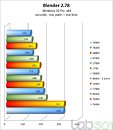Friday, September 29th 2017

Core i7-8700K Reviewed by Lab501
Ahead of the 5th October reviews NDA, Lab501 posted their review of the Core i7-8700K six-core processor using samples not provided by Intel, paired with an Aorus Z370 Ultra Gaming motherboard. The tests reveal that the i7-8700K trades blows with the Ryzen 7 1800X in multi-threaded tests, despite two fewer cores, and has a clear leadership in single-threaded tests. It also reveals that the i7-8700K may not be as pricier than the i7-7700K as previously thought. Interestingly, the i7-8700K also spells trouble for "Skylake-X" Core i7 SKUs such as the i7-7800X and i7-7820X, as it offers multi-threaded performance in proximity to them, while being cheaper overall.
The Core i7-8700K is able to sustain its Turbo Boost frequencies of 4.20 GHz better than Intel's other Core X HEDT chips, which translates into higher gaming performance. The tests reveal that today's games still don't need six cores, and on the merit of high sustained clock speeds alone, the i7-8700K is shaping up to be among the fastest processors you can choose for gaming PC builds. Lab501 also got the i7-8700K to overclock to 5.1 GHz with relative ease. The chip runs feisty hot at overclocked speeds, but rewards with HEDT-like performance. Find other interesting findings of Lab501 in the source link below.More results follow.
Source:
Lab501.ro
The Core i7-8700K is able to sustain its Turbo Boost frequencies of 4.20 GHz better than Intel's other Core X HEDT chips, which translates into higher gaming performance. The tests reveal that today's games still don't need six cores, and on the merit of high sustained clock speeds alone, the i7-8700K is shaping up to be among the fastest processors you can choose for gaming PC builds. Lab501 also got the i7-8700K to overclock to 5.1 GHz with relative ease. The chip runs feisty hot at overclocked speeds, but rewards with HEDT-like performance. Find other interesting findings of Lab501 in the source link below.More results follow.








102 Comments on Core i7-8700K Reviewed by Lab501
Oh, but a quick on topic... I happen to find this CPU as pretty badass all things considered.
That is cools better is icing on the cake.
Tempting to upgrade this 4790K box, but I'm not going to notice any difference realistically. So I upgraded my Oct 2014 bios to Mar 2017 version, that's my upgrade for now. :oops:
Creating poorly optimized applications and games and calling them demanding is just not acceptable. Current CPUs and GPUs are WAY more powerful than what majority of us need.
I work in the software industry and 90% of the code developers write is trash. I very frequently have to optimize code that takes millions of CPU seconds, and I have been able to bring it down to under 5 digits almost all of the times.
I might consider Intel for the next upgrade some time next year. I want to see what the improved Zen will perform first though. But honestly, six cores with high per core performance is just what I need.
With that price on DDR4 (because I use 2133Mhz DDR3), I'll wait for Zen 2.
Over clocking is never guaranteed to reach certain speeds.
Like with cars.... just because one engine was able to take x amount of "boost" does not mean all those same engines can take the same level of "boost"
www.gamersnexus.net/guides/3064-intels-thermal-problem-pt1-liquid-metal-vs-thermal-paste-benchmarks-7900x
:shadedshu:
AMD uses soldering but their CPU can't overclock much, so they have no problem about it.
In past thread I linked a video with Intel staff saying they needed a way to make CPU fail testing, but not damage itself, so they could examine those failures and figure out how to overcome them. I believe that using this paste is how they do so, as CPU will overheat faster. Temperatures do not kill CPUs anyway. Current does. So they make CPU overheat BEFORE current reaches dangerous levels, using traditional cooling methods. The paste is like a rev limiter.
And if an enthusiast wants to push harder, delid is pretty easy, especially if you have one of the many tools on the market for this.